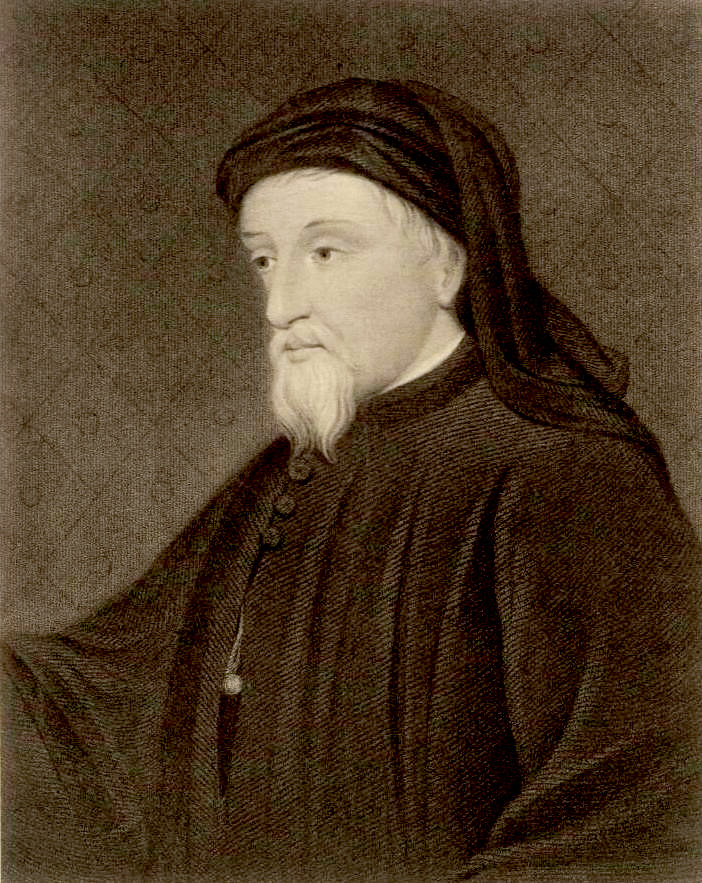Monday
Reader and contributor Sue Schmidt recently alerted me to an essay defending Geoffrey Chaucer with which I thoroughly agree. Apparently some believe that “the father of English poetry” was a rapist, racist and anti-Semite and want to drop him from the canon. In her defense, Jennifer Wollock counters that he was actually remarkably enlightened for his age. “My decades of research show he was no raunchy proponent of bro culture,” she writes, “but a daring and ingenious defender of women and the innocent.”
I long ago came to a similar conclusion from teaching the Wife of Bath’s prologue and tale, which I find to be centuries ahead of its time with regard to women’s liberation. To be sure, I was giving the work more than the author credit for this—sometimes a work can be more liberated than its author—but Wollock has convinced me that Chaucer the man was fully in the Wife’s camp when he has her articulate a vision of egalitarian marriage.
I’ll talk more about my own views in a moment. First, here’s Wollock’s summation of the charges:
It’s true that Chaucer’s work contains toxic material. His “Wife of Bath’s Prologue” in The Canterbury Tales, his celebrated collection of stories, quotes at length from the long tradition of classical and medieval works on the evils of women, as mansplained by the Wife’s elderly husbands: “You say, just as worms destroy a tree, so a wife destroys her husband.”
Later, “The Prioress’s Tale” repeats the anti-Semitic blood libel story, the false accusation that Jews murdered Christians, at a time when Jews across Europe were under attack.
What the critics get wrong, Wollock says, is confusing Chaucer with his characters. She attributes some of the confusion to Chaucer having been a former spy and therefore expert in indirection. He knew how “to express dangerous truths not accepted in his own day, when misogyny and antisemitism were both entrenched, especially among the clergy.”
Rather than “an exponent of toxic masculinity,” Wollock says, Chaucer “was actually an advocate for human rights”:
My own research shows that in the course of his career he supported women’s right to choose their own mates and the human desire for freedom from enslavement, coercion, verbal abuse, political tyranny, judicial corruption and sexual trafficking. In The Canterbury Tales and The Legend of Good Women, he tells many stories on such themes. There he opposed assassination, infanticide and femicide, the mistreatment of prisoners, sexual harassment and domestic abuse. He valued self-control in action and in speech. He spoke out for women, enslaved people and Jews.
“Women want to be free and not coerced like slaves, and so do men,” the narrator of “The Franklin’s Prologue” says.
Chaucer was equally advanced when it came to Judaism, Wollock says:
As for Jews, Chaucer salutes their ancient heroism in his early poem The House of Fame. He depicts them as a people who have done great good in the world, only to be rewarded with slander. In “The Prioress’s Tale” he shows them being libeled by a desperate character to cover up a crime of which they were manifestly innocent, a century after all Jews had been brutally expelled from England.
In other words, rather than endorsing the Prioress’s anti-Semitic story, he is using her words and actions, along with the other pilgrims’ reactions, to expose the danger of their lies.
“Few authors have ever been more outspoke about man’s inhumanity to women,” Wollock concludes. And as for the charge that he raped and abducted a young woman, Wollock notes that the evidence is sketchy at best, and unlikely given other things we know about him.
My own reading of the Wife of Bath bears Wollock out. When I first encountered her in graduate school, one of the leading scholars of the time (D.W. Robertson) believed that Chaucer ascribed to the misogyny that the Wife is attacking, but from the first this struck me as wrong.
As I saw it—and see it still—Chaucer creates a character who is so much bigger and more vibrant than the attacks that sexist monks were leveling against women that she exposes their smallness and pettiness. Her counterarguments may be wild and incoherent at times, but they have the effect of reducing their case against women to rubble.
In addition to that, she tells a fairy tale in which, by the end, a rapist knight learns that the only way to a good marriage is to listen—really listen—to your partner. The knight has spent a year listening to women as if his life depended on it because it does: if he doesn’t figure out what women most desire, he will be executed for the rape. Chaucer, who himself was a superb listener, knows that paying attention to people is the ultimate form of acknowledgement, and he sympathizes with the Wife’s desire for R-E-S-P-E-C-T from the men in her life. He can hear the painful longing beneath her bravado, even if none of her five husbands can.
By penetrating into her own innermost desires, Chaucer gives us one of the most three-dimensional characters in all of literature. Which means that we too, as readers, are expanded as we listen to her. When a medieval character challenges still-existent sexism, you know you are in the presence of a great author.
